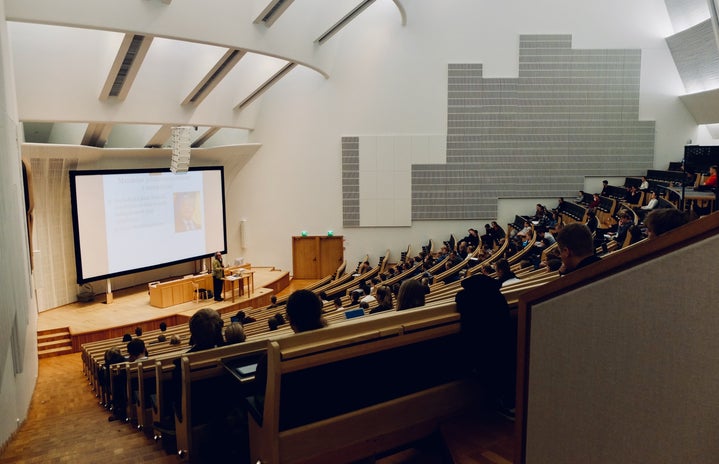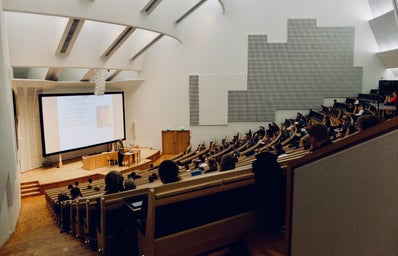Romanticising the everyday and the ‘fakehumans’ social media trend has now reached UCL
After a disrupted few terms, being back on UCL campus has been a welcome change. In addition to still getting lost on campus as a third year student, it seems that there is a new thing to consider when walking around campus. As I was scrolling through TikTok the other day (a lockdown obsession which I unfortunately haven’t been able to shift away from…), I was surprised to recognise the familiar scene of the main quad and, upon closer inspection, even more videos of places, and people, from UCL. The ‘fake humans’ trend on social media, which posts videos of random everyday people and adds short captions to create imaginary details about their life has now set its sights on UCL, as the TikTok account ‘fake_humans_of_ucl’ posts videos of students on campus and boasts 119.6k likes across their videos.
It seems getting noticed on campus, just like on the renowned Facebook confessions page UCLove, has now expanded to TikTok, yet this practice has rightly been met with a variety of opinions. While some find the account amusing and endearing in its portrayal of UCL students, the account’s filming of people without their permission has been criticized, such as on the ‘@imjustucl’ Instagram page. This trend can also be seen at many other global universities, such as the ‘fakehumans’ TikTok accounts for the University of Illinois and University of Edinburgh respectively, and cities such as ‘@fakehumansofchicago’ more broadly. I’m sure I’m not alone in the activity of making up imaginary backstories of people who have passed by on the street, but I would argue that this new form of ‘people watching’ is something to be considered carefully.
Examples on the UCL account, such as a video of a student walking across the main quad with accompanying text naming him as medical student ‘Alex’ who is ‘practically in love with Anna who lives opposite him for six months’ and new friends ‘Nik and Josh’ by Foster Court both possess not only high numbers of likes, but comments. People also tag their friends and this chain of interactions leads me to question the implications of becoming viral unknowingly. As a Yahoo article covering this trend proclaims how ‘The next big TikTok stars are people who don’t exist’, I can see why these viral videos could be uncomfortable for many. Comments on videos from the UCL focused account proclaim a “new fear unlocked” about the idea of being filmed and ending up on this page. It is worth noting that the ‘fake_humans_of_ucl’ account has included a disclaimer that anyone uncomfortable at being featured in a video can request for the video to be taken down, yet I can see why many have branded this account as intrusive. The individual(s) running the account are also anonymous, meaning those featured have no idea who is filming and when they are being filmed.
When looking at this new social media trend, I was very interested in understanding the reasons behind the virality of this trend. Though some of the comments mentioned above highlight the discomfort of many with this idea, others highlight the wish of many to be included, expressing their wish to have ‘stories’ made up for them. Furthermore, there is also evidence that this trend is expanding UCL’s outreach, as students from other universities and prospective students comment on their draw to the university given its presentation on this account. Aside from the issues of consent discussed above, I find the appeal of capturing everyday moments expressed by this trend particularly interesting, especially when only a few months ago ‘normal’ took on a monotonous banality during lockdown.
So what is it about these moments of people walking, chatting or simply standing that many so obviously feel are worth recording? After lockdowns and enforced isolation from one another, I would argue that this trend is perhaps evident of how the pandemic has made many of us appreciate the smaller moments of life a little more. The impromptu and casual nature of these videos suggests an attempt to portray the beauty of everyday life, almost as a new kind of online ‘storytelling’. Looking at the wider emergence of apps such as ‘BeReal’, an app which gives users daily notifications at specific moments of the day and gives them a window of two minutes to take pictures of what the front and back camera sees, shows this growing concern with ‘realness’. The ‘romanticizing your life’ trend on social media, which advocates people to ‘be the main character’ in what would otherwise be ordinary aspects of their daily lives, also supports the greater impact of the pandemic on how people are presenting their everyday lives on social media. Perhaps this ‘real humans’ trend is just more evidence for this mindset and consequent content shift, indicating more broadly how the pandemic has changed how and why we are engaging with what’s around us; no matter how big or small.
This being said, the importance of consent to this trend cannot be ignored, and I strongly support the notion that any future filming should absolutely be done with this in mind (and that any videos people are uncomfortable with are immediately removed from the page). It turns out that UCL campus may be a greater source of inspiration than we all thought, and that looking out for a personalised UCLove post has taken on a new dimension…
References:
Yahoo (2021). ‘The next big TikTok stars are people who don’t exist’. Available from: https://www.yahoo.com/lifestyle/next-big-tiktok-stars-people-205810881.html [Accessed 27 November 2021]


